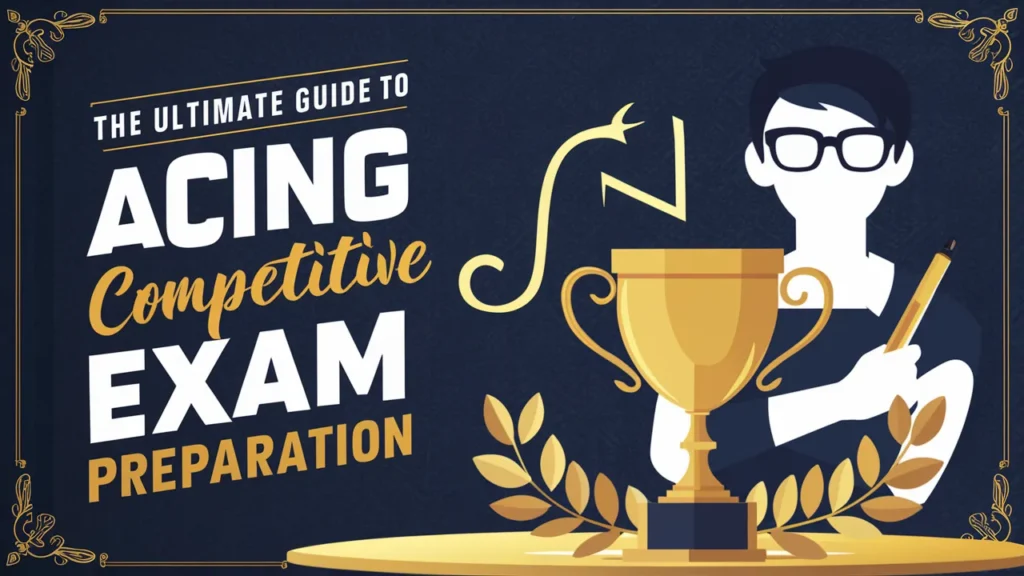
Competitive exams can be daunting, but confidence plays a crucial role in helping you succeed. Confidence isn’t just about knowing the answers—it’s also about believing in your abilities, managing stress, and maintaining a positive mindset throughout the preparation and on exam day. In this blog, we’ll explore practical tips and tricks to build confidence for competitive exams, ensuring you perform at your best when it matters most.
Why Confidence Matters in Competitive Exams
Before diving into strategies, let’s take a moment to understand why confidence is such an essential component of success in competitive exams.
- Enhanced Focus: Confidence helps you stay focused, avoiding distractions and unnecessary stress during your preparation and on the exam day.
- Better Problem Solving: A confident mindset allows you to tackle difficult questions without panicking, making it easier to analyze and solve them effectively.
- Reduced Anxiety: While a little bit of nervousness is natural, excessive anxiety can hinder performance. Confidence helps you manage anxiety and remain calm under pressure.
- Improved Memory Recall: When you’re confident, you’re more likely to trust your knowledge and memory, enabling quicker and more accurate recall during the exam.
1. Start with a Solid Study Plan
A well-organized study plan is the foundation of building confidence for competitive exams. When you have a clear path laid out, it reduces uncertainty and gives you control over your preparation. Here’s how to create an effective study plan:
- Understand the Exam Format: Research the exam pattern, syllabus, and marking scheme to gain a thorough understanding of what to expect.
- Set Realistic Goals: Break down your syllabus into smaller, manageable chunks and set achievable goals for each day or week. Hitting these milestones will boost your confidence.
- Include Breaks and Rest Days: Overworking can lead to burnout and diminish your confidence. Make sure to include regular breaks and rest days to recharge.
- Track Your Progress: As you tick off topics from your study plan, you’ll gain a sense of accomplishment, reinforcing your confidence in your ability to succeed.
2. Master Time Management
Time management is critical for both preparation and during the actual exam. If you manage your time effectively, you’ll not only cover all the topics in the syllabus but also have ample time for revision and mock tests.
- Create a Timetable: Dedicate specific time slots for each subject and stick to them. Prioritize difficult subjects early on, and allocate more time to areas that require extra attention.
- Use Productivity Techniques: Techniques like the Pomodoro Technique (25 minutes of focused study followed by a 5-minute break) can help you stay productive and focused.
- Simulate Exam Conditions: Practice solving past papers or mock tests within the exam’s time limit to get accustomed to the pressure. Knowing that you can complete the exam on time will give you a confidence boost.
3. Develop a Positive Mindset
The right mindset is crucial when preparing for any exam. Negative thoughts or self-doubt can quickly erode your confidence. Instead, develop habits that promote positivity:
- Affirmations: Use positive affirmations like “I am prepared” or “I can succeed” to replace self-doubt with self-belief. Repeating these phrases can help you internalize a confident mindset.
- Visualize Success: Take a few moments each day to visualize yourself successfully completing the exam. Imagine answering questions confidently and receiving great results.
- Avoid Comparison: Everyone’s learning journey is different, and comparing yourself to others can hurt your confidence. Focus on your personal progress and achievements instead.
4. Practice, Practice, Practice
Confidence comes with practice. The more familiar you are with the exam format and the types of questions you’ll face, the more confident you’ll feel on the actual day.
- Solve Past Papers: Practicing with previous years’ papers helps you get a feel for the type of questions you’ll encounter, and it also highlights areas where you may need more practice.
- Take Mock Tests: Regularly taking full-length mock exams under timed conditions can improve your speed and accuracy. Each successful test will strengthen your belief in your abilities.
- Analyze Your Performance: After each mock test or practice session, review your mistakes carefully. Understanding where you went wrong and how to correct it boosts your confidence for the next time.
5. Focus on Self-Care
Your physical and mental well-being directly impacts your confidence levels. Proper self-care ensures that your mind and body are in the best condition to tackle the pressures of exam preparation.
- Get Enough Sleep: A well-rested mind is sharper and more confident. Make sure you get 7-8 hours of sleep each night, especially leading up to the exam.
- Eat a Balanced Diet: Eating healthy foods rich in nutrients supports brain function and energy levels. Avoid junk food that can make you feel sluggish.
- Exercise Regularly: Physical activity reduces stress and boosts mood, both of which contribute to higher confidence levels. Even a short walk or yoga session can make a big difference.
- Practice Mindfulness or Meditation: Stress and anxiety are natural during exam preparation, but mindfulness techniques or meditation can help you stay calm and focused. These practices also boost your overall confidence by centering your thoughts.
6. Surround Yourself with Positivity
The people around you can either boost or diminish your confidence. Surround yourself with a supportive environment that encourages you to stay positive and focused.
- Join Study Groups: Working with peers who share your goals can be highly motivating. Group study sessions can help you clarify doubts, gain new perspectives, and reinforce your understanding.
- Seek Guidance from Mentors: If possible, connect with teachers, mentors, or successful candidates who have gone through the exam process. Their insights and encouragement can significantly boost your confidence.
- Avoid Negative Influences: Steer clear of conversations or people who instill fear or doubt about the exam. Instead, engage with those who are optimistic and supportive.
7. Trust in Your Preparation
Lastly, the ultimate key to confidence is trust—trust in your preparation, your abilities, and your hard work. As exam day approaches, remind yourself of the effort you’ve put in and the progress you’ve made.
- Accept That Perfection Isn’t Necessary: No one gets everything right all the time, and that’s okay. Focus on doing your best rather than striving for perfection.
- Stay Calm on Exam Day: Anxiety is natural, but you can manage it. On exam day, take deep breaths, arrive early, and avoid last-minute cramming, which can increase stress. Trust that you are prepared and capable of handling the exam.
Conclusion
Building confidence for competitive exams is not just about mastering the syllabus; it’s also about cultivating a positive mindset, effective time management, and regular practice. By following these tips, you can boost your confidence and approach the exam with a calm and focused attitude.
Remember, confidence is built over time through consistent effort and self-belief. So, stay committed to your preparation, take care of yourself, and trust in your abilities. With the right approach, you can ace your competitive exams with confidence and success.


